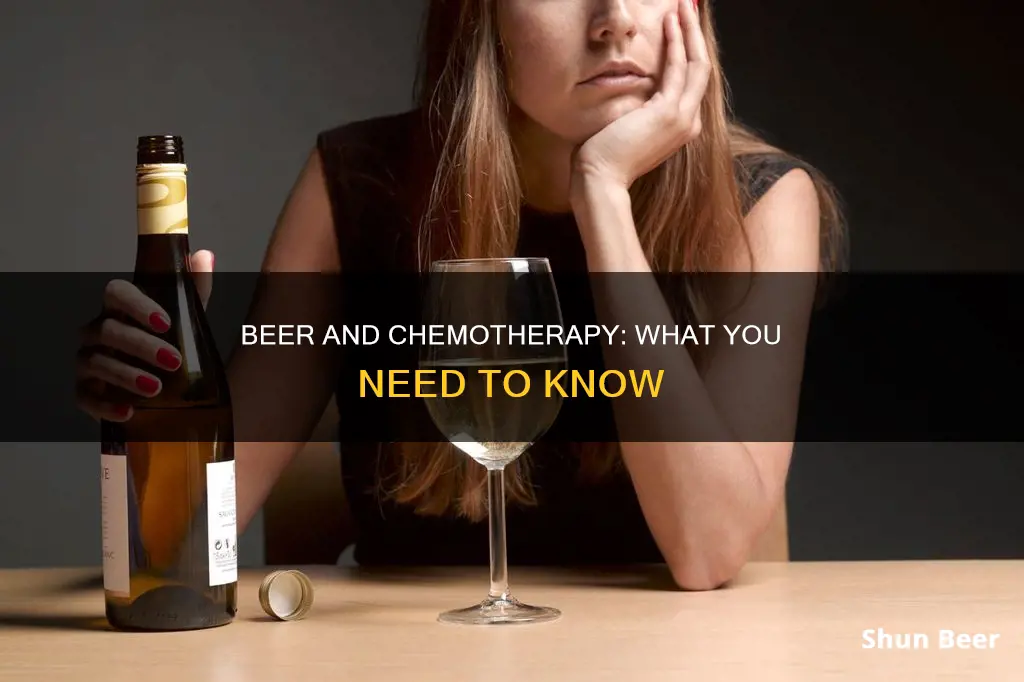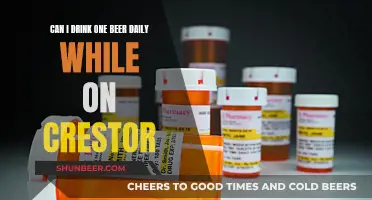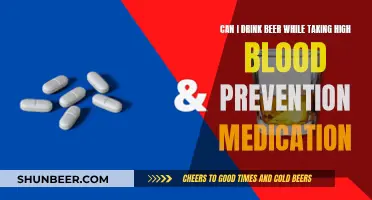
Drinking alcohol while undergoing chemotherapy is generally discouraged by health professionals. Alcohol is processed by the liver, as are many chemotherapy medications, and this combination can put additional strain on the organ. Alcohol is also known to cause dehydration, which can worsen nausea and make chemotherapy harder to tolerate. Furthermore, alcohol can irritate mouth sores, a common side effect of chemotherapy, and can also increase the risk of developing several types of cancer. However, some sources suggest that drinking a small amount of alcohol during chemotherapy is unlikely to have serious effects, but it is always best to consult a doctor before consuming any alcohol while undergoing treatment.
| Characteristics | Values |
|---|---|
| Alcohol consumption during chemotherapy | It is generally advised to avoid alcohol during chemotherapy as it can cause liver inflammation, impair chemotherapy drug breakdown, and increase side effects from treatment. However, drinking a little alcohol occasionally is unlikely to have serious effects, but it is important to check with your doctor first. |
| Alcohol as a cancer-causing agent | Alcohol is a known carcinogenic agent, increasing the risk of mouth, pharynx, and larynx cancers, as well as potentially lung, pancreatic, and skin cancers. |
| Alcohol and chemotherapy drug interaction | Some chemotherapy drugs interact with alcohol and could make the patient unwell. |
| Alcohol and mouth sores | Alcohol can irritate and worsen mouth sores, a common side effect of chemotherapy. |
| Recommended alcohol intake | If consumed at all, women should have no more than 1 drink per day, and men should have no more than 2 drinks per day. |
What You'll Learn
- Alcohol is processed by the liver, which can cause additional strain when combined with chemotherapy drugs
- Excessive drinking can make chemotherapy treatment less effective and increase the chances of cancer returning
- Alcohol can irritate mouth sores, a common side effect of chemotherapy, and make nausea worse
- Drinking alcohol during chemotherapy can cause dehydration, which can make chemotherapy harder to tolerate
- Alcohol consumption is associated with a higher risk of developing several types of cancer

Alcohol is processed by the liver, which can cause additional strain when combined with chemotherapy drugs
Alcohol is processed by the liver, and so is chemotherapy medication. This means that drinking alcohol during chemotherapy can cause additional strain on the organ.
Chemotherapy is a type of cancer treatment that uses strong drugs to slow or stop the growth of cancer cells. These drugs are often broken down by the liver. Alcohol is also processed by the liver, and drinking it during chemotherapy can put extra stress on this vital organ. This combination can lead to liver inflammation, which may impair the breakdown of chemotherapy drugs and increase their side effects.
Additionally, alcohol can cause dehydration, making nausea worse and chemotherapy harder to tolerate. It can also irritate or worsen mouth sores, a common side effect of chemotherapy. If you have mouth sores or are at risk of developing them due to your treatment, it is best to avoid alcohol.
The type of alcohol consumed does not matter, as all alcoholic beverages contain ethanol, a known carcinogen. Even moderate drinking can increase the risk of developing several types of cancer. For cancer survivors, alcohol intake has been linked to a higher risk of recurrence.
If you are undergoing chemotherapy, it is essential to consult your healthcare team before consuming any alcohol. They will advise you based on the specific drugs you are taking and your overall health condition. Excessive drinking should be avoided, regardless of the type of chemotherapy you are receiving.
It is worth noting that chemotherapy may also affect your taste buds, and you may not enjoy alcohol as much during treatment. This change in taste usually returns to normal once the treatment is completed.
Paleo Diet and Beer: Is It Allowed?
You may want to see also

Excessive drinking can make chemotherapy treatment less effective and increase the chances of cancer returning
While undergoing chemotherapy, it is best to avoid alcohol. This is because alcohol is processed by the liver, and so are many chemotherapy medications. Excessive drinking can cause additional strain on the liver, which can impair the breakdown of chemotherapy drugs and increase their side effects.
Drinking alcohol during chemotherapy can also worsen side effects such as dehydration, diarrhoea, and mouth sores. Alcohol can also irritate or make mouth sores worse, and it may enhance feelings of nausea.
Furthermore, alcohol is a known cancer-causing agent, increasing the risk of mouth, pharynx, and larynx cancers. It also increases the risk of at least seven types of cancers, including lung, pancreatic, and skin cancers. For people being treated for cancer, alcohol consumption can make their treatments less effective, and for long-term cancer survivors, it may increase the chances of their cancer returning.
For example, studies show that breast cancer survivors who drank more than three to four drinks per week were at a higher risk for recurrence. Excess drinking is also associated with weight gain, which is one of the greatest known risk factors for cancer.
Therefore, it is recommended to limit alcohol consumption to no more than one drink per day for women and no more than two drinks per day for men. It's important to consult with a healthcare professional before consuming any alcohol during chemotherapy treatment.
Beer and Booster Shots: What's Safe?
You may want to see also

Alcohol can irritate mouth sores, a common side effect of chemotherapy, and make nausea worse
It is generally not recommended to consume alcohol while undergoing chemotherapy. This is because alcohol is processed by the liver, and so are many chemotherapy drugs. Consuming alcohol during chemotherapy can cause additional strain on the liver, which can affect the breakdown of chemotherapy drugs and increase their side effects.
One of the side effects of chemotherapy is mouth sores. Alcohol can irritate these mouth sores and make them worse. It can also make nausea worse. Therefore, it is best to avoid alcohol, especially if you have mouth sores. If you are starting a treatment that may cause mouth sores, such as head and neck radiation or certain chemotherapy drugs, it is advisable to refrain from consuming alcohol.
If you are undergoing chemotherapy, it is important to consult your healthcare team before consuming any alcohol. They will be able to advise you based on the specific drugs you are taking and the potential risks and side effects. Excessive drinking is never advisable, regardless of the type of chemotherapy you are undergoing.
While the occasional beer or glass of wine during chemotherapy may not have serious effects, frequent or heavy alcohol consumption is generally discouraged. Alcohol can worsen certain side effects of chemotherapy, such as dehydration, diarrhea, and mouth sores. It can also interact with chemotherapy drugs, affecting their effectiveness.
Ginger Beer Before a Colonoscopy: Safe or Not?
You may want to see also

Drinking alcohol during chemotherapy can cause dehydration, which can make chemotherapy harder to tolerate
Drinking alcohol during chemotherapy is generally not recommended, as it can cause dehydration, which can worsen the side effects of chemotherapy and make the treatment harder to tolerate.
Chemotherapy is a cancer treatment that uses strong drugs to slow or stop the growth of cancer cells. While chemotherapy targets cancer cells, it can also affect healthy cells that divide quickly, such as those in the digestive tract, immune system, and hair follicles. This can lead to various side effects, including lowered immunity, hair loss, nausea, vomiting, and mouth sores.
Alcohol consumption can worsen some of these side effects, particularly dehydration, diarrhoea, and mouth sores. Alcohol is also processed by the liver, as are many chemotherapy drugs, so drinking during chemotherapy can place additional stress on this organ.
In addition, alcohol can increase the risk of developing several types of cancer and can interfere with chemotherapy treatment, making it less effective. For cancer survivors, alcohol intake has been shown to increase the risk of cancer recurrence. Therefore, it is generally advised to avoid alcohol during cancer treatment and to limit consumption for overall survivorship.
If you are undergoing chemotherapy and have questions about alcohol consumption, it is important to consult with your healthcare team or doctor. They can provide personalized advice and recommendations based on your specific treatment plan and health condition.
Drinking Beer in Public: Italian Laws and Culture
You may want to see also

Alcohol consumption is associated with a higher risk of developing several types of cancer
Drinking alcohol during chemotherapy is generally not recommended, as it can cause additional strain on the liver, which is also responsible for processing many chemotherapy drugs. Alcohol can also worsen side effects such as nausea, dehydration, and mouth sores. However, some sources state that drinking a little alcohol won't affect most types of chemotherapy, but it is important to check with your doctor first.
Now, let's discuss the link between alcohol consumption and cancer risk in more detail:
Alcohol consumption is indeed associated with a higher risk of developing several types of cancer. According to the National Institute on Alcohol Abuse and Alcoholism, alcohol drinking can cause several types of cancer, and this risk increases with the amount of alcohol consumed, especially over time. Even light or moderate drinkers have an increased risk of certain cancers compared to non-drinkers. Heavy drinkers have an even higher risk, with a strong association with cancers of the oral cavity, pharynx, and larynx. Alcohol consumption is also linked to an increased risk of esophageal cancer, liver cancer, breast cancer, colorectal cancer, melanoma, and cancers of the female reproductive system.
The reasons for the increased cancer risk include the fact that alcohol is broken down into acetaldehyde, a known carcinogen that damages DNA and inhibits DNA repair mechanisms. Alcohol can also affect hormone levels, particularly estrogen, which can promote cell growth and division, increasing the chances of cancerous cells developing. Additionally, alcohol interferes with the absorption of vital nutrients that protect the body from cancer, such as vitamins A, B, C, D, E, K, and folate, as well as minerals like iron and selenium.
The combination of alcohol and tobacco use has a synergistic effect, greatly increasing the risk of cancers of the upper digestive and respiratory tract. This means that over 75% of these cancers in developed countries are attributed to alcohol and tobacco use.
It is important to note that the type of alcoholic beverage (such as beer, wine, or liquor) does not seem to significantly impact the risk, as they all contain ethanol. The key factor is the amount of alcohol consumed.
While moderate alcohol consumption may have some protective effects against certain types of heart disease, the potential benefits do not outweigh the increased cancer risk. The optimal number of drinks per day to minimize overall health risks is zero.
Pumping and Drinking: Is It Safe to Mix?
You may want to see also
Frequently asked questions
It is not recommended to drink beer or any other alcoholic beverage while having chemotherapy. Alcohol is processed by the liver, and so are many chemotherapy drugs. This combination can cause additional strain on the organ. Alcohol also causes dehydration, which can worsen the side effects of chemotherapy, such as nausea.
Chemotherapy can cause side effects such as lowered immunity, hair loss, nausea, and vomiting. It can also lead to fatigue and loss of appetite.
According to a study, about 75% of people undergoing cancer treatment reported drinking alcohol, with many drinking heavily. This highlights the immediate and unmet need to intervene on behalf of individuals with cancer who engage in risky drinking behaviours.
Drinking alcohol during chemotherapy can have several harmful consequences. It can make cancer treatments less effective and increase the risk of cancer recurrence. Alcohol also increases the risk of developing several types of cancer and can cause liver inflammation, impairing the breakdown of chemotherapy drugs and increasing their side effects.







